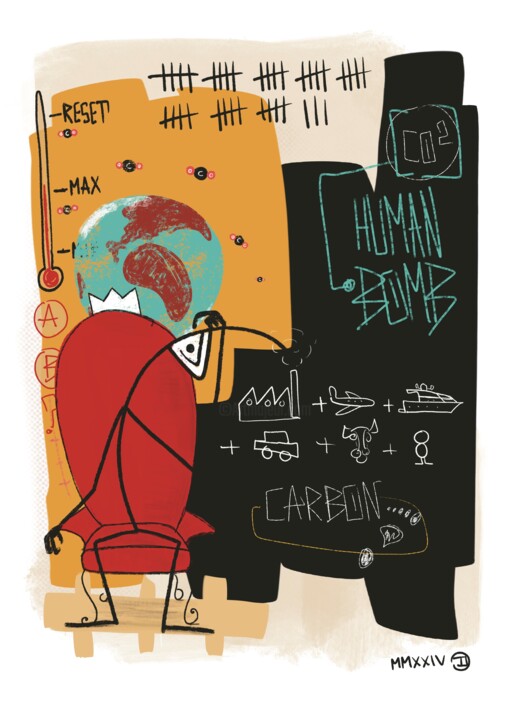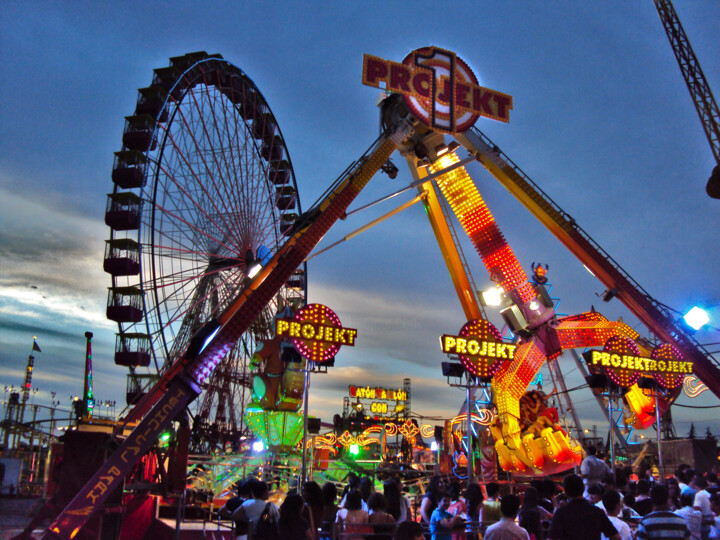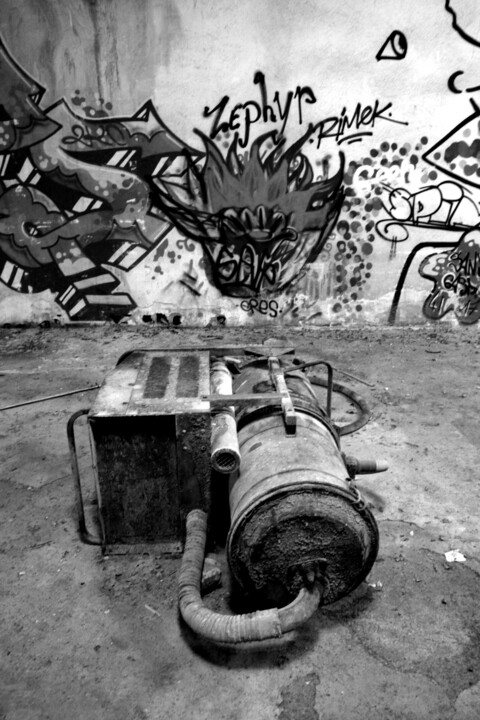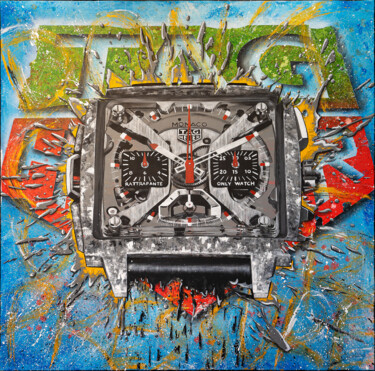28 Obras de arte originais, edições limitadas e gravuras:
Seja arte de rua, arte urbana ou graffiti, essas novas tendências artísticas estão estabelecidas há várias décadas em todas as grandes cidades: de Nova York a Paris ou de Londres a Tóquio via Rio. de Janeiro. Em primeiro lugar, o uso da palavra “street art” é relativamente recente. Data dos anos 2000. Foi utilizado em 2006 durante os primeiros leilões de arte representando obras deste movimento artístico. Em 2008, a exposição "street art" na Tate Modern em Londres impôs este termo para descrever este novo movimento artístico singular caracterizado por uma grande diversidade de estilo (graffiti, colagens, stencils, instalações, frescos, mosaicos, autocolantes...)
Você poderia dizer que é um movimento artístico global que começou na década de 1960 e ainda está vivo hoje. A diversidade de meios utilizados, estilos, técnicas e a liberdade de criação no espaço público. É um novo movimento que entrou para a história da arte.
Quem criou a arte de rua?
Vestígios de arte foram encontrados nas paredes desde tempos imemoriais. Quer se trate de arte parietal nas grutas de Lascaux, quer de nomes encontrados nas paredes de Pompeia, a arte do desenho e do graffiti no espaço público encontra-se a todo o momento. O que hoje se chama de arte de rua não é, portanto, totalmente novo.
Na França, na década de 1930, o artista Brassaï, interessado em grafites, decidiu fotografá-los para memorizá-los em fotos. Na década de 1950, Jacques Villeglé (1926-) e Raymond Hains recuperam cartazes da rua para recriar uma obra de arte com esses pedaços dilacerados de cartazes. Eles lançaram assim as primeiras bases do que mais tarde se tornaria arte de rua. Paralelamente, Gérard Zlotykamien (1940-), em 1963, começa a pintar silhuetas pretas e vermelhas na rua que chamaria de “efêmeras”. Ele continuará pintando suas silhuetas por vários anos.
Esse tema de silhuetas e o uso de tinta spray também são importantes na obra de Ernest Pignon-Ernest (1942-). Suas silhuetas cortadas em estêncil e desenhadas nas paredes são sua assinatura. Ele vai invadir certos lugares e paredes com suas criações como os grafiteiros de hoje.
No final da década de 1960, na Filadélfia (Estados Unidos), o primeiro dos "gráficos" foi o artista Cornbread, que assinava por toda parte. Assim nascem as primeiras tags: Letras maiúsculas feitas com spray aerossol. Muitos jovens seguem seu exemplo e marcam seus nomes nas paredes.
Em 1969 Julio 204, em Nova York é um dos primeiros a marcar na cidade, ele também é o primeiro a adicionar seu número de rua à sua assinatura. Fenômeno que se tornará o marco do movimento de Nova York. Taki 183 é realmente o primeiro pichador a se tornar conhecido na cidade, cobrindo paredes e trens do metrô com suas assinaturas.
Diante do aumento do número de grafiteiros, os artistas começam a buscar se diferenciar. Stay High 149 é o primeiro a adicionar elementos gráficos à sua assinatura, dobrando sua marca e adicionando o halo visível na série Le Saint. Seguindo isso, muitos grafiteiros seguirão seu exemplo e o estilo se tornará cada vez mais inventivo. A fase 2 é o artista destacado que modificará a tag criando formas de letras cada vez mais originais e finalizando sua composição com uma seta.
O prolífico artista do final dos anos 1970, Seen, produziu obras em cores brilhantes e contrastantes, enquanto Blade trabalhava em perspectiva e geometria em seu trabalho. Ele é um dos primeiros artistas a ser visto por uma galeria e a fazer sua primeira exposição.
O fenômeno da arte de rua está se espalhando por todo o mundo
O estilo está evoluindo cada vez mais, às vezes se afastando do grafite original. A verdadeira caçada das autoridades contra os artistas que marcam as portas e os vagões do metrô se intensifica, os artistas são obrigados a redobrar sua engenhosidade para trabalhar sendo cada vez mais rápidos em seu trabalho e na criatividade para poderem se destacar de outros artistas . Isso também levará a uma mudança de local de trabalho e ao aumento de paredes como suporte para suas conquistas. A evolução de sua ferramenta de trabalho a lata de aerossol evolui. Muitas cores aparecem e as pontas de spray permitem aos artistas uma variedade de espessuras de linhas.
Os artistas Futura, Dondi White, Rammellzee ou A-One foram os principais artistas do final dos anos 1979 e início dos anos 1980 nos EUA. São também os primeiros a dar uma mensagem mais ou menos política ao seu trabalho. Desde 1979, locais de arte e galerias alternativas têm se interessado e exibido artistas de arte de rua. O sucesso tornou-se internacional e a partir dos anos 80 os artistas Blade, Futura ou Seen expuseram em inúmeras exposições na Europa. Museus europeus, como o museu Boijmans Van Beuningen em Rotterdam, adquirirão obras de arte de rua. Com as exposições e a descoberta da street art através das viagens, a partir de 1983 e 1984, o fenómeno alastrou-se pela Europa (França, Itália, Alemanha...)
Em Paris, o primeiro grafiteiro conhecido é Bando que importa graffiti na França e se junta aos artistas Blek le Rat e Jérôme Mesnager que fazem stencils em artistas usando suportes urbanos.
O início hesitante do grafite parisiense está concentrado nas margens do Sena, entre a Pont Neuf e a Pont de la Concorde. Os intercâmbios entre artistas europeus estão se intensificando. O artista inglês Mode 2 trabalhará assim em Paris com Bando que depois colaborará com o holandês Sho. As trocas também estão se intensificando com artistas norte-americanos como JonOne que conheceu Bando em Nova York, vai mostrar a ele o que está sendo feito em Paris. JonOne então vem para Paris, ele então se junta ao Bad Boy Crew (BBC) e acaba ficando permanentemente na capital francesa. JonOne se diferenciará de outros artistas, concentrando-se no movimento e não nas letras. No início dos anos 1990, a BBC exibiu em toda a Europa.
Qual é a mensagem da arte de rua?
Se até agora a arte de rua era essencialmente uma técnica de marcação, a partir dos anos 1990 a arte urbana experimentará uma pequena revolução. Alguns artistas substituirão a assinatura por representações de rostos, retratos...- como Shepard Fairey, também conhecido como Obey. Ainda estudante, em 1989, criou um ícone “André o Gigante Tem um Bando” e com ele fez um autocolante que distribuiu aos amigos a pedir-lhes que o colassem por todo o lado. Seu objetivo é nos conscientizar de que todas as imagens que vemos têm um significado e que é importante entendê-lo.
A nova geração não vai mais usar apenas a lata de aerossol para invadir o espaço urbano, mas vai usar adesivos, colagem, mosaico, stencil...
O francês Space Invider invadirá o espaço público colando tesselas de mosaico nas paredes para criar visuais inspirados no jogo de arcade de 1978 Space Invaders. A Invader instalou mais de 3.000 peças em mais de 60 cidades ao redor do mundo.
Em reação à poluição visual criada pela comunicação comercial no espaço público, o artista Zevs irá desviar os logotipos de grandes marcas, liquefazendo-os nas fachadas das lojas de departamento após o anoitecer. Ele também criará sombras de objetos de mobiliário urbano pintando as sombras desses objetos nas calçadas.
Ao longo dos anos, o artista Banksy usará sua arte para denunciar as falhas da sociedade com humor, poesia e visuais chocantes, em particular usando a técnica do estêncil. Suas cenas simples e refinadas surpreendem e marcam as mentes. Ele rapidamente se tornou um dos artistas mais famosos. Outros artistas franceses usarão esta técnica como Miss.Tic, Blek le Rat, Jef Aérosol ou C215.
A arte de rua está em constante evolução. Desde o simples graffiti dos seus primórdios ao graffiti de Seen ou JonOne, as técnicas vão-se diversificando. Os grafiteiros continuam a usar latas de spray para criar seus trabalhos. Mas também utilizam novas técnicas e suportes como mosaico, estêncil, adesivo, instalações, escultura ou projeção de vídeo.
Alguns artistas de arte de rua famosos
Banksy
Artista que conseguiu manter sua identidade em segredo da mídia. Seus trabalhos feitos principalmente em stencil inicialmente nas ruas de Londres antes de invadir as ruas do mundo inteiro.
A sua obra satírica e subversiva é realizada com o objetivo de evidenciar um modo de pensar diferente do ambiente. Principalmente os meios de comunicação de massa. Seu trabalho se concentra em fortes demandas políticas e sociais.
O documentário de 2010 "Exit Through the Gift Shop" foi indicado ao Oscar de Melhor Documentário.
Shepard Fairey
Nascido em 1970, é um artista contemporâneo conhecido por suas serigrafias gráficas. Conhecido primeiro por seus adesivos, seu trabalho ficou famoso graças ao seu pôster de Barrack Obama durante a eleição presidencial dos EUA em 2008.
Seu trabalho está nas coleções de muitos museus, como o Museu de Arte Moderna de Nova York e o Victoria and Albert Museum de Londres.
Jeff Aerossol
Artista nascido em 1957. Ele é um dos pioneiros da arte de rua na França no início dos anos 1980. Artista de estêncil, ele cria retratos de personalidades como Elvis Presley, Lennon, Basquiat... mas também de pessoas anônimas como crianças, transeuntes ou mendigos.
Citações de artistas de arte de rua
Banksy
"O graffiti é um dos poucos caminhos disponíveis quando você não tem quase nada. E embora você não possa curar a pobreza neste mundo com uma foto, pelo menos você pode fazer alguém sorrir enquanto mija".
"Os maiores crimes não são cometidos por quem quebra as regras, mas por quem obedece às ordens. São eles que jogam bombas e massacram aldeias."
Gerard Zlotykamien
"A criação é uma doença, uma anomalia da qual não tenho intenção de me curar!"
Quais são os maiores festivais de arte de rua?
Muitos festivais de arte de rua e arte urbana acontecem em todo o mundo:
- Na França, o Grenoble Street Art Fest, o Efeito Underground em Paris la Défense, o Zoo Art Show em Lyon.
- Na Grã-Bretanha, o Bristol's Upfest
- Na Noruega, NuArt
- No Canadá, o Mural de Montreal
- Na Espanha, o Asalto, Zaragoza, Bloop Festival, Ibiza, Arco Madrid, Miau Fanzara
- Nos EUA, Wynwood Miami, The Jersey City Mural Arts Program, Detroit - Murals In The Market, Hawaii Kaka'ako - Pow! Uau!, Sacramento - Wide Open Walls, Atlanta - Living Walls
- Na Bélgica, Ostende - O Navio de Cristal
- Na Suíça, Art Basel
- Na Polônia, Lodz - Formas Urbanas
- Na China, Hong Kong – Hkwalls
Quais são os filmes para ver sobre arte de rua?
- Get to the Wall: Um Documentário de Banksy
- Chats perchés: Um documentário sobre M Chat
- Out dirigido pelo artista de rua francês JR.
- Downtown 81 – Jean-Michel Basquiat: filme volta ao início da carreira de Basquiat.
- Stations of the Elevated: um documentário sobre o graffiti de Nova York.
- Wild Style, filme dos anos 1980: documentário sobre a cultura urbana americana e o graffiti.
- Escritores 1983-2003, 20 anos de graffiti em Paris
Discover contemporary artworks on ArtMajeur
Contemporary art is a vibrant constellation of artistic expressions. This creative universe encompasses a wide array of mediums, from paintings, sculpture, and photography to drawing, printmaking, textile art, and digital art, each medium a star shining with its own distinct radiance. Artists use diverse supports and materials to bring their visions to life, such as canvas, wood, metal, and even innovative digital canvases for the creation of virtual masterpieces.
A contemporary painting, for instance, may weave its story through the masterful strokes of acrylic or oil, while a contemporary sculpture might sing its song in the language of stone, bronze, or found objects. The photographic arts capture and manipulate light to produce striking images, while printmaking employs techniques like lithography and screen-printing to produce multiples of a single, impactful image. Textile art plays with fabrics and fibers, whereas digital art pushes the boundaries of creation with innovative technology.
The allure of contemporary art lies in its boundary-pushing nature, its relentless quest for experimentation and its constant reflection of the evolving human experience. This boundless creativity, coupled with its strong social and personal commentary, makes every piece of contemporary art a unique emblem of its time, a mirror held up to the realities and dreams of our complex world. It whispers to us, moves us, provokes thought, and kindles a deep emotional response, stirring the soul of anyone willing to listen. It is, indeed, the language of emotions and ideas, spoken in the dialect of our era.

©2024 Thomas Jarry
Origins and history of contemporary art
The story of contemporary art unfolds in the mid-20th century, marked by seismic shifts in artistic expression. Post-World War II, around the 1950s and 1960s, artists began experimenting beyond traditional confines, challenging the norms of what art could be. This revolutionary epoch birthed myriad new movements and artistic forms such as abstract expressionism, pop art, and minimalism. Paintings, once confined by realism, embraced abstraction, as artists used color and form to express emotions and ideas. Notable periods like the advent of pop art in the late 1950s and early 1960s saw artworks mimicking popular culture and mass media, reflecting society’s shifting focus.
The sculptural arts, too, witnessed a metamorphosis. Sculptors started to experiment with new materials and forms, often creating artworks that interacted with the viewer and the surrounding space, fostering a sense of engagement. Drawing, a timeless practice, also evolved, with artists incorporating innovative techniques and concepts to redefine its role in contemporary art.
Photography, a relatively new medium, emerged as a powerful tool in the contemporary art landscape. Born in the 19th century, it truly came into its own in the latter half of the 20th century, blurring the lines between fine art and documentation. Printmaking, a practice dating back to ancient times, saw renewed interest and experimentation with techniques like lithography, etching, and screen printing gaining prominence.
The realm of textile art expanded dramatically, as artists began to appreciate the versatility and tactile quality of fabric and fibers. Artists began using textiles to challenge the boundaries between fine art, craft, and design.
The dawn of digital technology in the late 20th century heralded a new age for contemporary art. Digital art emerged as artists started leveraging new technologies to create immersive, interactive experiences, often blurring the line between the virtual and the physical world.
Through these transformative periods, the essence of contemporary art has remained the same: a dynamic, evolving reflection of the times we live in, continually pushing boundaries and embracing the new, always questioning, always exploring.

©2024 Majic Vic
Evolutions of theses contemporary works in the art market
As we navigate through the 21st century, the dynamic landscape of contemporary art continues to evolve and expand, reflecting our ever-changing world. Contemporary paintings, once primarily confined to two-dimensional canvases, now embrace a multitude of forms and techniques, ranging from mixed media installations to digital creations, each piece a rich a weaving of thoughts, emotions, and narratives. Sculpture, too, has ventured far beyond traditional stone and bronze, with artists incorporating light, sound, and even motion, embodying the ephemerality and flux of the modern world.
Photography, in the hands of contemporary artists, has expanded its horizons, seamlessly blending with digital technology to create breathtaking imagery that challenges our perception of reality. Drawing, as well, has transcended the borders of paper, incorporating multimedia elements and exploratory techniques to redefine its role in the artistic discourse. Printmaking continues to flourish, with contemporary artists using traditional methods in innovative ways to deliver potent social and personal commentaries.
Textile art, once considered a craft, now holds a prominent place in the contemporary art world, with artists using it to explore issues of identity, tradition, and cultural heritage. Meanwhile, digital art, the newest member of the contemporary art family, has revolutionized the way we create and interact with art, presenting immersive experiences that blur the boundary between the virtual and the physical.
These diverse forms of contemporary art hold significant value in the current art market, not only due to their aesthetic appeal but also their ability to encapsulate and communicate complex ideas and emotions. Collectors, curators, and art lovers worldwide seek these works, drawn to their inherent dynamism, their innovative use of materials, and their eloquent expressions of our shared human experience. As a testimonial to our times, these contemporary artworks encapsulate the pulse of our society and the resonance of individual voices, forever etching our collective narrative into the annals of art history.

©2023 Dav
Famous Contemporary Artists
As we delve into the vibrant realm of contemporary art, we encounter an array of artists who shape this dynamic field. Each a master in their medium - painting, sculpture, photography, drawing, printmaking, textile, or digital art - they push artistic boundaries, reflecting our era and challenging perceptions. Let’s explore these remarkable contributors and their groundbreaking works.
1. Gerhard Richter - Known for his multi-faceted approach to painting, Richter challenges the boundaries of the medium, masterfully oscillating between abstract and photorealistic styles. His works, whether featuring squeegee-pulled pigments or blurred photographic images, engage in a fascinating dialogue with perception.
2. Jeff Koons - A significant figure in contemporary sculpture, Koons crafts monumental pieces that explore themes of consumerism, taste, and popular culture. His iconic balloon animals, constructed in mirror-polished stainless steel, captivate with their playful yet profound commentary.
3. Cindy Sherman - An acclaimed photographer, Sherman uses her lens to explore identity and societal roles, particularly of women. Renowned for her conceptual self-portraits, she assumes myriad characters, pushing the boundaries of photography as a medium of artistic expression.
4. David Hockney - Hockney, with his prolific output spanning six decades, is a pivotal figure in contemporary drawing. His bold use of color and playful exploration of perspective convey an intoxicating sense of joy and an unabashed celebration of life.
5. Kiki Smith - An innovative printmaker, Smith’s work explores the human condition, particularly the female body and its social and cultural connotations. Her etchings and lithographs speak to universal experiences of life, death, and transformation.
6. El Anatsui - A master of textile art, Anatsui creates stunning tapestry-like installations from discarded bottle caps and aluminum scraps. These shimmering, flexible sculptures blend traditional African aesthetic with contemporary art sensibilities, speaking to themes of consumption, waste, and the interconnectedness of our world.
7. Rafael Lozano-Hemmer - A leading figure in digital art, Lozano-Hemmer utilizes technology to create interactive installations that blend architecture and performance art. His work, often participatory in nature, explores themes of surveillance, privacy, and the relationship between people and their environments.

©2023 Dav
Notable contemporary artworks
The contemporary art landscape is a dynamic patchwork of diverse expressions and groundbreaking ideas, each artwork a unique dialog with its audience. Here are a selection of some renowned contemporary artworks, spanning various media such as painting, sculpture, photography, drawing, printmaking, textile art, and digital art, that have profoundly influenced this vibrant movement.
"Cloud Gate" by Anish Kapoor, 2006 - This monumental stainless steel sculpture, also known as "The Bean," mirrors and distorts the Chicago skyline and onlookers in its seamless, liquid-like surface, creating an interactive experience that blurs the line between the artwork and the viewer.
"Marilyn Diptych" by Andy Warhol, 1962 - An iconic piece of pop art, this silkscreen painting features fifty images of Marilyn Monroe. Half brightly colored, half in black and white, it reflects the dichotomy of celebrity life and its influence on popular culture.
"Rhein II" by Andreas Gursky, 1999 - This photographic artwork, a digitally-altered image of the Rhine River, is celebrated for its minimalist aesthetic. It strips the landscape to its bare essentials, invoking a sense of tranquility and vastness.
"Black Square" by Kazimir Malevich, 1915 - A revolutionary painting in the realm of abstract art, this piece, featuring nothing more than a black square on a white field, challenges traditional notions of representation, symbolizing a new era in artistic expression.
"Puppy" by Jeff Koons, 1992 - This giant sculpture, a West Highland Terrier blanketed in flowering plants, explores themes of innocence, consumer culture, and the interplay between high art and kitsch. It’s a delightful blend of traditional sculpture and garden craft.
"Re-projection: Hoerengracht" by Ed and Nancy Kienholz, 1983-1988 - A room-sized tableau representing Amsterdam’s red-light district, this work combines elements of sculpture, painting, lighting, and found objects. It engages viewers in a stark commentary on commodification and objectification.
"Untitled" (Your body is a battleground) by Barbara Kruger, 1989 - This photomontage, combining black-and-white photography with impactful text, explores issues of feminism, identity, and power. Its potent, confrontational message is a prime example of the power of text in contemporary visual art.
"For the Love of God" by Damien Hirst, 2007 - This sculpture, a platinum cast of a human skull encrusted with 8,601 diamonds, probes themes of mortality, value, and the human fascination with luxury and decadence. It’s a compelling blend of macabre and magnificence.
"Physical impossibility of Death in the Mind of Someone Living" by Damien Hirst, 1991 - This artwork, featuring a tiger shark preserved in formaldehyde, blurs the line between traditional sculpture and biological specimen. It prompts viewers to contemplate mortality and nature’s ferocity.
"One and Three Chairs" by Joseph Kosuth, 1965 - A piece of conceptual art, it presents a physical chair, a photograph of a chair, and a dictionary definition of a chair, thus exploring the relationship between language, picture, and referent in art.
These pieces, in their diversity, exemplify the rich tapestry of contemporary art, each piece a unique commentary on our world and a testament to the limitless potential of creative expression.

Enzo Tomasini
Fotografia | Vários tamanhos

Cicero Spin
Jato de tinta em Tecido | 34,3x34,3 in

Martina Marten
Acrílico em Tela | 39,4x27,6 in

Majic Vic
Fotografia | 9,1x12,2 in

Artistikthanh
Acrílico em Tela de linho | 39,4x39,4 in

Art$Art
Fotografia | Vários tamanhos






















